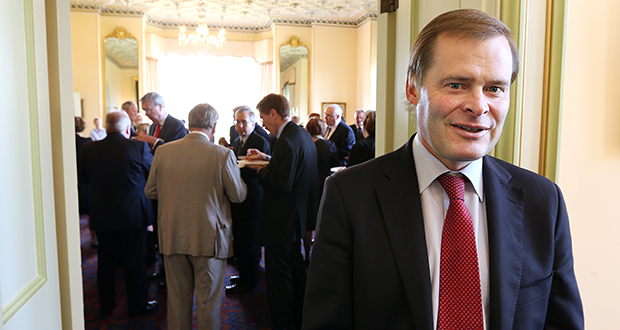Former vice-chancellor Professor Peter Rathjen engaged in “entirely inappropriate” conduct at a work function and treated two women employed by the University of Adelaide with “egregious disrespect”, an investigation has found.
The former head of the university stepped down from his position in July, the day after first giving evidence to the South Australian Independent Commissioner Against Corruption (ICAC).
Delivering a statement rather than a report to avoid further harm to the two women involved, commissioner Bruce Lander said Rathjen kissed one of the women and repeatedly touched her bottom while they were at a hotel.
Rathjen also hugged a second woman while they were at the hotel “and in doing so deliberately placed both of his hands around her waist” and placed one hand on her waist at the top of her bottom.
All of the behaviour – which Lander described as sexual in nature and advertised by Rathjen to the women as sexual – was “unwanted and unwelcome”.
Lander said: “It was all the worse having regard to his position within the University and the two women’s relative positions in the University.”
Rathjen gave evidence contrary to the accounts of the women but Lander rejected his take on the encounters.
Chancellor Kevin Scarce – who resigned in April, one day after being told by the deputy chancellor that he would be stood down if he did not resign – met with Rathjen in May 2019 to put the allegations to him, which he did not deny.
Still, the commissioner found that Rathjen lied to Scarce on three occasions and lied to Lander himself during his investigation. “I have found that he has lied when it suited him to do so," the commissioner said.
One such lie was in response to an email from the chancellor in which he asked Rathjen for a response to claims made in a July 2019 blog by Michael Balter about previous sexual harassment on the part of the vice-chancellor “going back to his earlier days as a professor”. Rathjen told Scarce that there was nothing the Chancellor needed to know in relation to his past conduct.
Lander found that Rathjen’s actions put him in breach of his contract of employment. “In my opinion his conduct, having regard to the serious power imbalance between him and the victims, amounted to serious misconduct for the purposes of the Independent Commissioner Against Corruption Act 2012 (ICAC Act).”
He added that apart from the vice-chancellor, none of the university’s public officers including the chancellor engaged in misconduct or maladministration.
Deputy chancellor Catherine Branson – who during the ICAC investigation attested to her own possible error of judgement surrounding conversations with Rathjen about her desire to become chancellor that were had at the same March meeting in which she discussed the first woman’s allegations – apologised for the former vice-chancellor's conduct on behalf of the university.
"The university is deeply sorry, as I am deeply sorry, that while employed at our university they were treated in a wholly inappropriate way by our former vice-chancellor," she said on Wednesday.
"The matter should have been handled differently.”
During the investigation, Branson said she was in some doubt about whether the university would be able in 2020 to dismiss Rathjen and "was conscious of the fact that the chancellor was committed to retaining the vice-chancellor to guide the University through COVID-19".
On Wednesday, Branson said any small pockets of inappropriate conduct "must be weeded out".
Professor Rufus Black, vice-chancellor of the University of Tasmania – for which Rathjen is the immediate past vice-chancellor – alerted staff of the ICAC findings.
Black said his university's own investigation into Rathjen’s behaviour to date has determined that there was no known evidence of sexual harassment or sexual assault during his tenure there but invited staff or students to share experiences related to Rathjen’s time as vice-chancellor.
“Today I want to assure you that there is no tolerance at our University for sexual harassment or sexual assault,” he said. “If there are unreported, undetected issues in Tasmania, we are ready to support anyone with experiences they want to share, knowing how difficult it can be to come forward.”
Another of Rathjen’s former employers, the University of Melbourne, found through an external review that he committed serious sexual misconduct in the mid-2000s, the ABC reported.
The university received a formal complaint from a former student in May alleging Rathjen had committed serious sexual misconduct against her while he was the dean of science between 2006 and 2008.
Universities Australia chair Professor Deborah Terry said she wanted to send a strong message to the sector, which was: “Sexual assault and sexual harassment are not acceptable. Not on our campuses, and not in Australian society.”
Terry added: “On behalf of our sector, I want to recognise the strength of the women involved and the trauma that they have experienced.
“To all victims and survivors I say this: we support you and believe you. Violence against women is never okay, and everyone has a right to be safe.”
Do you have an idea for a story?Email [email protected]
 Campus Review The latest in higher education news
Campus Review The latest in higher education news

